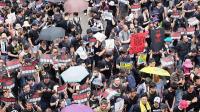Verisk Maplecroft report predicts civil unrest to continue in 2020

Escalation in protests across the globe in 2019 are forecast to persist into the new decade, according to Verisk Maplecroft report.
Following a turbulent year of protests, 75 countries are projected to see an increase in civil unrest during the next six months, according to a quarterly Civil Unrest Index (CUI) produced by risk consultancy Verisk Maplecroft. Civil unrest was widespread in 2019, affecting one-quarter of all countries worldwide and intensifying in the final quarter.
Some 47 jurisdictions saw a significant rise in protests, with more outbursts of public discontent expected in the year ahead, according to the CUI. Hong Kong and Chile ranked as the world’s riskiest locations in terms of severity and frequency of protests in the index, while Sudan overtook Yemen as the highest risk country globally.
The number of countries rated as ‘extreme risk’ jumped by two-thirds, from 12 in 2019 to 20 by early 2020. Countries moved into the 'extreme risk' category included Ethiopia, India, Lebanon, Nigeria, Pakistan and Zimbabwe.
The CUI, which uses 11 separate indicators and risk analyst forecasts to form its 198-country ranking of civil unrest risks to businesses, found that subsidy cuts were the single biggest indicator of growing civil unrest in Chile, Lebanon and Zimbabwe. The CUI stated that most sectors felt the impact of civil unrest during 2019, ranging from mining and energy to tourism, retail and financial services.
The first month of unrest in Chile alone was estimated to have caused $4.6bn-worth of infrastructure damage, costing the Chilean economy about $3.3bn, equivalent to 1.1% of its GDP. The report forecast that the underlying causes of the Chile protests, namely income inequality and high costs of living, will not be addressed and the country will stay in the extreme risk category until at least the first quarter of 2022.
The report also saw little prospect of a resolution to the ongoing Hong Kong protests, which were sparked by a proposed bill in June 2019 to extradite criminals to mainland China. It projected that the Hong Kong protests will continue for the next two years, with a minor improvement by early 2022.
Protestors are at the highest risk of extrajudicial killings, arbitrary arrest and torture in the 36 countries rated extreme risk in a separate Security Forces and Human Right Index produced by Verisk Maplecroft. Extreme risk countries included China, Turkey, Saudi Arabia, Russia and Thailand, all of which are forecast to experience an uptick in protests over the next six months.
For businesses facing security challenges and needs for protection of their international operations, the report stated the significant risk of state-sanctioned violence to country’s and complicit companies’ environmental, social and governance (ESG) profiles.
Most of the grievances underlying the civil unrest in 2019 were “deeply entrenched and would take years to address”, according to the index. “The next 12 months are likely to yield more of the same, and companies and investors will have to learn to adapt and live with this new normal,” it concluded.

Global greenfield investment trends
Crossborder investment monitor
|
|
fDi Markets is the only online database tracking crossborder greenfield investment covering all sectors and countries worldwide. It provides real-time monitoring of investment projects, capital investment and job creation with powerful tools to track and profile companies investing overseas.
Corporate location benchmarking tool
fDi Benchmark is the only online tool to benchmark the competitiveness of countries and cities in over 50 sectors. Its comprehensive location data series covers the main cost and quality competitiveness indicators for over 300 locations around the world.
Research report
fDi Intelligence provides customised reports and data research which deliver vital business intelligence to corporations, investment promotion agencies, economic development organisations, consulting firms and research institutions.
Find out more.




